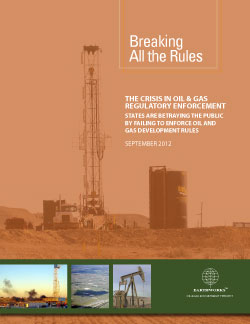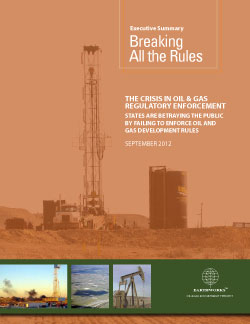350.org * Clean Air Council * Clean Water Action * Food & Water Watch *
Oil Change International * Sierra Club
Newly uncovered enforcement data shows more than half of all wells go uninspected, financial penalties total less than the value of one well
September 25th, Washington, D.C. – Today Earthworks released Breaking All the Rules: The Crisis in Oil & Gas Regulatory Enforcement, a new research study revealing that states across the country are failing to enforce their own oil and gas development regulations. The one-year, in-depth research project examined enforcement data and practices in Pennsylvania, Texas, Ohio, New York, New Mexico and Colorado and included interviews with ex-industry and state agency employees.
“State enforcement of oil and gas rules is broken,” said Earthworks’ Senior Staff Attorney Bruce Baizel. He continued, “Across the country, public health and safety are at risk because states are failing to uphold the rule of law. Until states can guarantee they are adequately enforcing their own rules on an ongoing basis, state agencies must not permit new drilling.”
Failure to enforce oil and gas regulations means that states are not seeking, documenting, sanctioning, deterring, and cleaning up problems associated with irresponsible oil and gas operations such as chemical spills, equipment failure, accidents, and discharges into drinking water supplies
Among the study’s findings –
- More than half of all wells go uninspected each year: hundreds of thousands of active oil and gas wells across the country are not inspected.
- Companies that are found in violation are rarely penalized: ambiguous policies and rules leave the consequences for violations unclear to the public, companies and even the inspectors themselves. Consequences vary from violation to violation.
- Penalties are so weak that it is cheaper for violators to pay the penalty than comply with the law: the total value of financial penalties in each state studied is less than or equivalent to the value of the gas contained in one single well.
“I left my home in DISH because gas development threatened my family’s health”, said Calvin Tillman, former mayor of DISH, Texas. He continued, “That’s because Texas oil and gas regulators are ill-equipped and unmotivated to enforce their own rules. This report shows that rules and regs aren’t worth the paper they’re written on if they’re not enforced.”
Drawn from both the data analysis and the stakeholder interviews, the report makes numerous common sense policy and regulatory recommendations to address the enforcement crisis, including —
- Increasing inspection/enforcement resources until they meet a systematically and transparently developed minimum;
- Clarifying and updating rules so inspectors, companies, and the public know when operators are in violation, and the consequences;
- Formalizing the public’s role in enforcement, including sharing information with the public and allowing citizen suits.
“It’s critical that people everywhere be protected from the public health and environmental dangers associated with fracking,” said Food & Water Watch Executive Director Wenonah Hauter. “The fact that states are failing to enforce their own laws reinforces the fact that fracking isn’t safe—even when regulated. That’s why the federal government needs to ban this dangerous, toxic process.”
“This report shows that the industry’s claim that ‘oil and gas development doesn’t threaten public health’ is a fraud,” said Earthworks Executive Director Jennifer Krill. She continued, “Until common sense changes are implemented, states must refuse to issue new drilling permits. ”


